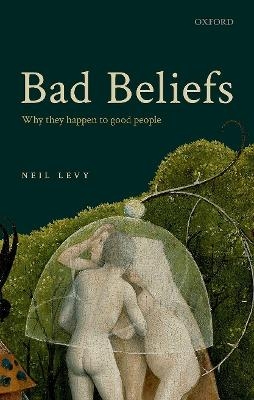
Bad Beliefs
Oxford University Press (Verlag)
978-0-19-289532-5 (ISBN)
This is an open access title available under the terms of a CC BY-NC-ND 4.0 International licence. It is free to read at Oxford Scholarship Online and offered as a free PDF download from OUP and selected open access locations.
Bad beliefs - beliefs that blatantly conflict with easily available evidence - are common. Large minorities of people hold that vaccines are dangerous or accept bizarre conspiracy theories, for instance. The prevalence of bad beliefs may be politically and socially important, for instance blocking effective action on climate change. Explaining why people accept bad beliefs and what can be done to make them more responsive to evidence is therefore an important project.
A common view is that bad beliefs are largely explained by widespread irrationality. This book argues that ordinary people are rational agents, and their beliefs are the result of their rational response to the evidence they're presented with. We thought they were responding badly to evidence, because we focused on the first-order evidence alone: the evidence that directly bears on the truth of claims. We neglected the higher-order evidence, in particular evidence about who can be trusted and what sources are reliable. Once we recognize how ubiquitous higher-order evidence is, we can see that belief formation is by and large rational.
The book argues that we should tackle bad belief by focusing as much on the higher-order evidence as the first-order evidence. The epistemic environment gives us higher-order evidence for beliefs, and we need to carefully manage that environment. The book argues that such management need not be paternalistic: once we recognize that managing the epistemic environment consists in management of evidence, we should recognize that such management is respectful of epistemic autonomy.
Neil Levy is Professor of Philosophy at Macquarie University, Sydney, and a Senior Research Fellow at the Oxford Uehiro Centre for Practical Ethics. He was previously a Research Council Future Fellow at the Florey Institute of Neuroscience and Mental Health. He works on the philosophy of agency and ethical issues in neuroscience, as well as related areas, and has published extensively on these topics. He is the author of Consciousness and Moral Responsibility (Oxford University Press, 2014) and Hard Luck (Oxford University Press, 2011), among other books.
Preface: Rational Social Animals Go Wild
1: What Should We Believe About Belief?
2: Culturing Belief
3: How Our Minds are Made Up
4: Dare to Think?
5: Epistemic Pollution
6: Nudging Well
Concluding Thoughts: Rational Animals After All
| Erscheinungsdatum | 04.01.2022 |
|---|---|
| Verlagsort | Oxford |
| Sprache | englisch |
| Maße | 143 x 224 mm |
| Gewicht | 382 g |
| Themenwelt | Geisteswissenschaften ► Philosophie ► Erkenntnistheorie / Wissenschaftstheorie |
| Geisteswissenschaften ► Philosophie ► Ethik | |
| ISBN-10 | 0-19-289532-X / 019289532X |
| ISBN-13 | 978-0-19-289532-5 / 9780192895325 |
| Zustand | Neuware |
| Haben Sie eine Frage zum Produkt? |
aus dem Bereich


![Was heißt Denken?. Vorlesung Wintersemester 1951/52. [Was bedeutet das alles?] - Martin Heidegger](/media/113619842)